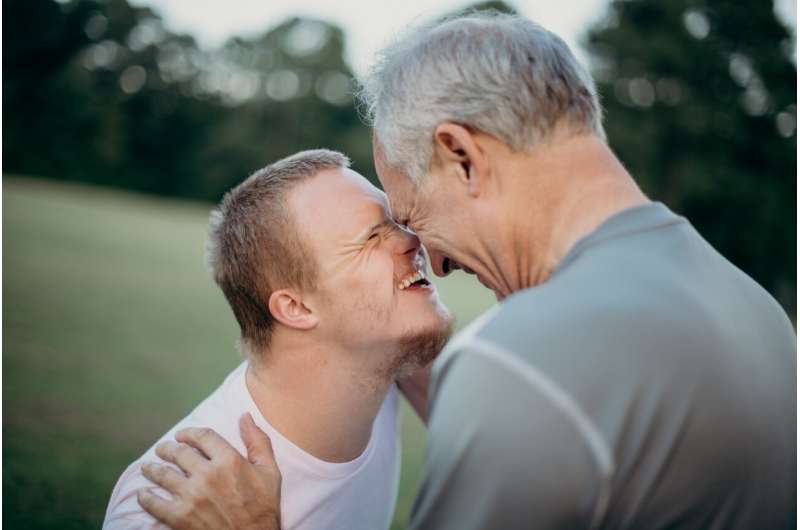This article has been reviewed according to Science X's editorial process and policies. Editors have highlighted the following attributes while ensuring the content's credibility:
fact-checked
peer-reviewed publication
trusted source
proofread
Study shows that US and other countries can do more to improve quality of life for people with Down syndrome

A new study led by investigators from Massachusetts General Hospital assesses for the first time the quality of daily life for people with Down syndrome (DS) in 50 countries around the world.
The research is published in Genetics in Medicine.
The survey's questions cover five domains of well-being—health care, education, policy, independence, and community inclusion—reflecting the quality-of-life issues that are important to people with DS and their family members.
In general, the countries that scored the lowest across the quality-of-life domains were in Africa and Asia, while the highest-scoring countries were in Europe and North America. On some specific domains, however, some smaller countries, such as Estonia, Lithuania, Malta, Pakistan, and Peru, had higher scores than larger, wealthier countries.
"The genetics of people with Down syndrome are largely the same regardless of where they live, but their outcomes can be dramatically different from country to country," said senior author Brian G. Skotko, MD, MPP, the Emma Campbell Endowed Chair on Down Syndrome at Massachusetts General Hospital and associate professor of pediatrics at Harvard Medical School.
"This study shows that your potential as a person with Down syndrome is in large part dependent not on your genetics, but on the leaders within your country and the resources and supports that your community offers."
Previous research on quality of life in individuals with DS had focused on specific issues, such as health-related quality of life and cardiac surgery outcomes, and usually among people living in a particular country.
"Ours is the first study to holistically examine quality of life, which provides a truer assessment of well-being and allows policymakers and advocates to identify best practices as well as areas for improvement," said lead author Daniel J. Kats, MD, a pediatric hospitalist at Massachusetts General Hospital. "It is also the first such study done on an international scale."
An international group of Down syndrome experts from 11 countries on six continents convened over five years to develop the novel survey used in the study, called the Down Syndrome Societal Services and Supports Survey.
"We had no funding to do this research," said Skotko. "Leaders in the Down syndrome advocacy community around the world participated out of a passion to highlight successes as well as shine a light on areas of need among people with Down syndrome."
The survey was distributed to DS organizations around the world. The results include responses from the 55 organizations in 50 countries that met the research inclusion criteria.
The United States had an overall ranking of 13th among 45 countries in achieving a high quality of life for people with DS. For the specific domains, the U.S. scored 11th for community inclusion, 7th for education, 17th for health care, 10th for independence, and 36th for policy and law. The top-scoring countries overall were the United Kingdom, Canada, Italy, the Netherlands, and Spain.
"Although the United States has always been viewed as a liberal champion of rights for people with disabilities, the reality is that people with Down syndrome here still do not have all the resources and supports across our country for them to live to their fullest potential," said Skotko. "There's still much for us to learn from other countries around the world where there are more supports, resources, and societal acceptance of people with neurodiversity."
The U.S., for example, lags other countries in providing opportunities for people with DS to find meaningful work, and in universally providing general resources such as daycare, parental leave, or access to mental health care, according to Kats. And, unlike more than 100 other countries, the United States hasn't ratified the United Nations Convention on the Rights of Persons with Disabilities.
In addition, the U.S. lacks national laws that protect and support people with DS, such as those that exist in Scandinavian countries. "In the U.S., the resources and services people with Down syndrome receive can vary significantly depending on the state in which they live," said Skotko.
The results of the study are also available at Down Syndrome Quality Of Life. The researchers plan to repeat the survey every two years and will update the rankings and track countries' progress on the website.
The researchers hope that their study will help organizations advocate more effectively for people with Down syndrome, which, in turn, will improve their quality of life, said Skotko. "We want to make tomorrow a little better than today," he said. "We hope that this study will democratize life's potential for people with Down syndrome."
More information: Daniel J. Kats et al, Results of inaugural international Down Syndrome Societal Services and Supports survey, Genetics in Medicine (2024). DOI: 10.1016/j.gim.2024.101114

















